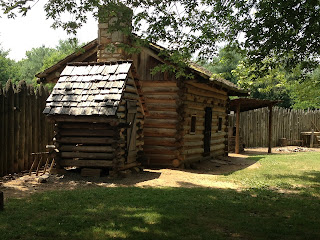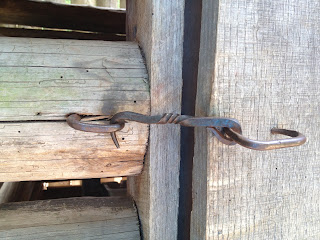What the British failed to take into consideration was the fact that the Appalachian Mountains served as more than a physical barrier between the colonies and the frontier - the Scots-Irish settlers of the Appalachian region were separated from the Cause by a fierce independence and a belief that the politics of the colonies had little bearing on their own lives and interests.
These Overmountain Men (as they would later be called), would likely have remained out of the war completely, had the British kept away from their homes and territory, but they didn't. And thanks to that decision, the outcome of the American Revolution was very different than it probably would've been otherwise.
This did not sit well with the Overmountain Men - the Scots-Irish settlers of Northeast Tennessee and North Carolina (using today's state boundaries to identify them).
The Overmountain Men followed Cornwallis and Ferguson, and using guerrilla tactics, harried them endlessly - effectively slowing the progress of the British/Loyalist troops.
In anger, Ferguson gave chase until the Overmountain Men melted away and back to their homes. At his limit, Ferguson sent a message after them:
"If you do not desist your opposition to the British Arms, I shall march this army over the mountains, hang your leaders, and lay waste your country with fire and sword."And that was the moment the Overmountain Men decided to bring the war to Ferguson. Two Patriot militia leaders of the Overmountain Men - Isaac Shelby and John Sevier - called for a muster on September 25th, 1780 at Fort Watauga, located at Sycamore Shoals (near Elizabethton, Tennessee).
The response was overwhelming - men from Southwest Virginia, North Carolina and Northeast Tennessee all converged at the mustering grounds - approximately 1,000 of them at final count.
They then proceeded to trek 330 miles to King's Mountain, North Carolina, where they initiated an uphill (literally) battle against Ferguson's nearly equal troop force.
The battle lasted a little more than an hour and before it was over, Ferguson was singled out by the Patriot militia and shot off his horse by no fewer than seven bullets. At the end of the day, the British lost approximately 200 troops with another 160 or so wounded. The Overmountain Men only lost 28 men with 62 more being wounded in the Battle of King's Mountain - a battle that would later have the Commander-in-Chief of the British forces, General Sir Henry Clinton saying that the battle was "'the first link of a chain of evil events' that ended in 'the total loss of America.'"
This decisive battle is one that is seldom featured in history textbooks as more than a passing reference - a battle name in a long list of battles fought during the War for Independence. However, as I was to learn, thanks to a suggestion to check out these Appalachian Patriots by Mrs. Maggie Goad, the Overmountain Men may be the ones that we have to thank for this beautiful America of ours earning its freedom and nationhood, rather than remaining a colony of the British Empire!
Thanks to some guidance by another friend and supporter of this little blog of mine, I found myself at Sycamore Shoals State Historic Park a few weeks ago where I was able to explore the scene of at least one part of this monumental event - the location of the Overmountain Men muster.
At the entrance to the park's Visitor's Center, I was greeted by this gorgeous statue of an Overmountain Man. The picture below shows a close-up shot of the dedication.
After perusing the Visitor's Center - a great place full of books and reproduction toys, tools and other memorabilia of the 18th century, I headed out the back doors and almost immediately came upon Fort Watauga (or, rather, the reconstructed and relocated Fort Watauga, but who really cares?).
According to the park brochure, the present Fort Watauga was built to as closely mirror the original as was possible based on historical records and what remained of the original structures at the old site.
The fort is not at all extensive, but it is fantastic - attention has been given to every detail - even down to the hardware used in the buildings, and the tools and other utensils used on the grounds.
While visiting the park, I discovered that during the last three weekends in July, the outdoor drama, Liberty! will take place at this site. This outdoor reenactment tells the story of the history of Fort Watauga and Sycamore Shoals from the days of the founding of the Watauga Settlement, to their involvement in the Revolutionary War. For more details, just click on the Calendar of Local Events tab of this blog, or visit the official website for the drama by clicking here.
They had even reconstructed a blacksmith's shed and gardens outside the fort walls!
This park is not only a terrific place to visit, but also a place of national importance. So much so, that it was designated a National Historic Landmark in 1975.
So as you sit back and enjoy those fireworks this 4th of July, take a moment and remember the contribution of those dedicated patriots who helped turn the tide of the Revolutionary War - the Overmountain Men of Appalachia!
And Happy Independence Day!





















No comments:
Post a Comment